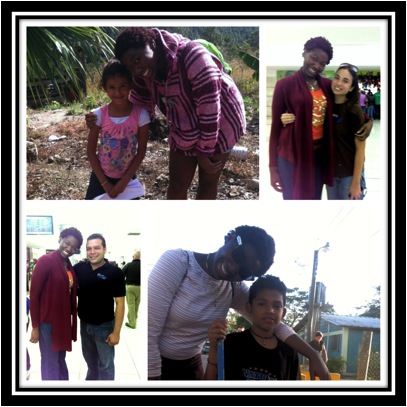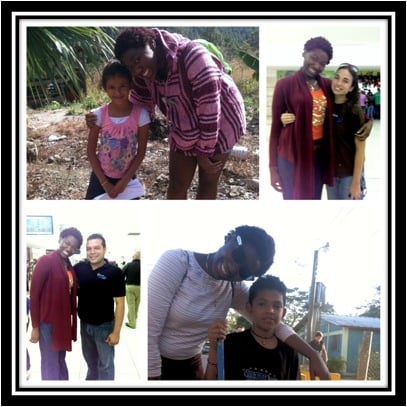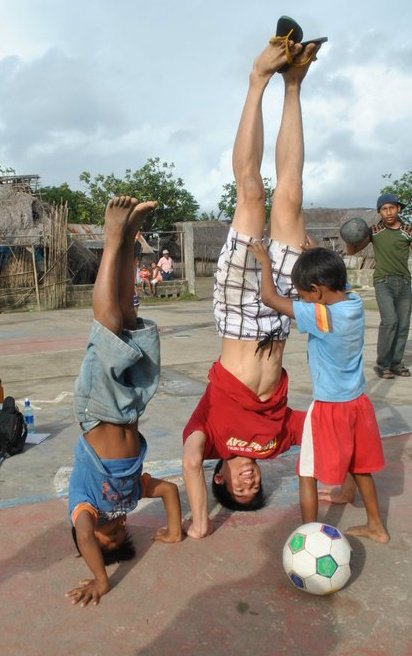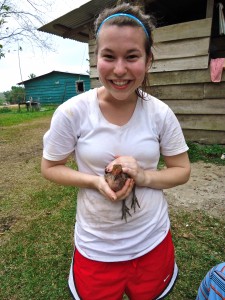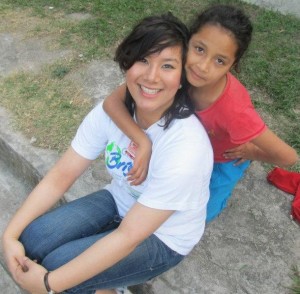Each week we bring you the story and perspective of an outstanding volunteer. This week, meet Maria Adebayo, a Microfinance Brigades volunteer from Johns Hopkins University who recently participated in a Brigade to Ghana.
—
Whenever I stopped at the side of Ojo Road – the main Street of Plateau, Nigeria – as a child, m eyes were always engrossed by the horde of filthy little kids who would encircle our car. The streets were dirty, and the people were hustling water or oranges; everything seemed so primitive. Almost everywhere I went was poverty-stricken. There were unpaved roads and vile gutters that were covered by mere planks of Wood. And wherever these places were, the young, as well as the old people, begged for anything – a coin or a piece of bread. I would often wonder how I could help the horde of kids that would always harass the window of our car. What was my purpose?
Coming from Nigeria and living there for two years, I understand what underprivileged people go through. While my life has been almost luxurious by comparison, they have had to struggle, relentlessly and fearlessly, every day. I feel that I owe it to not only them, but most importantly to myself (as a product of a less developed country), to Nigeria, and the greater community of the underprivileged. I have a burning desire to help the less fortunate and I knew the Microfinance Brigade was the perfect realm to do so. I wanted to be an integral part to changing the lives of the underprivileged in Honduras. I wanted to pursue my passion not through books, readings, or lectures, but through true experience. I wanted to be able to actually bear witness to the conditions in which these people live and see how, through the teamwork of my group and I, our decision could help to augment their lives. Most importantly, I wanted to fulfill my purpose in life.
Working in El Junco really reminded me of Nigeria. The roads were not paved, buildings were not finely built with the finest brick or marble as in America, and there were many faces of hard-working people in need. However, something that I did not experience in Nigeria was going to a community isolated on the top of mountains. Their community is everything to them on top of those mountains. Knowing this, I knew I had to put all my effort in fulfilling my purpose.
At first, I was skeptical as to how the Hondurans would accept my group; however, I was very honored at the fact that they allowed my group and I in their midst and welcomed us with open arms. We even had the pleasure to bond with them on a cultural level: we planted coffee beans, squeezed out sugar cane juice, and played soccer with a few community members.
Going on community visits was vital to the Microfinance Brigade, learning about the financial situations of these community members. With each and every house, we were greeted with much hospitality: parting gifts of coffee and oranges. Not only did the financial confessions open up my eyes, but merely the journey to get to those houses. We had to cross little rivers, hike up and down mountains, and dodge stray dogs during our ten to forty-minute walks. It was not a game I was playing but it was real life.
Everything was so real and I knew I had to put my best foot forward to make a real life change.
I came up with the idea to make long-term financial plans with each household, because, though there might have been a language barrier, there is no such thing as a number barrier as math is an international language. This really helped in getting the message across because the plan remained even after we left. Speaking to people of all ages who were in worse positions than I was empowered me to make sure to produce the best advice possible.
There were all too many memories that saturate my mind when I think of my brigade trip. However, one that I think is notable to mention is our trip to the orphanage. The kids there were either orphaned or their parents dropped them off for a portion of the year because they could not support them. My group and I brought them tons of candy, which they really loved. They all latched on to my group members and I individually, and we had a little friend for the day; I was lucky to make two good friends. We were all able to communicate with each other since I spoke Spanish and they spoke some English. I gave them the rest of my big bag of candy and promised to return before I left Honduras. However, unfortunately, I was not able to see them again but I have promised to myself to see them again. To make friends with younger kids who barely spoke my language and brightening up people’s day just by spending time with them really brought me immense joy.
Once returning to the United States, I have definitely decided to travel more. There is so much to experience in the world. I have vowed to myself to go back to Honduras, be it for another brigade trip or for doing research about income disparities and its socio-economic effects in different communities.
It blows my mind to think that eight young college students from America could have such an impact on people’s lives. I have learned soooo much more about microfinance with the help of my group. The fact that we were able to suggest an insurance backing company for all the Cajas shows we were moving in the right direction. Most importantly, I have learned about Hondurans: they have an immeasurable drive for success, a love for their community, and a wish to better themselves. I can now appreciate my privileged life even more. I was truly blessed by God to have a different life, but they too are blessed with determination and optimism that many people lack. I cannot wait to dedicate my life to helping others. I truly admired Elise and Alex for doing so and I envy them.

